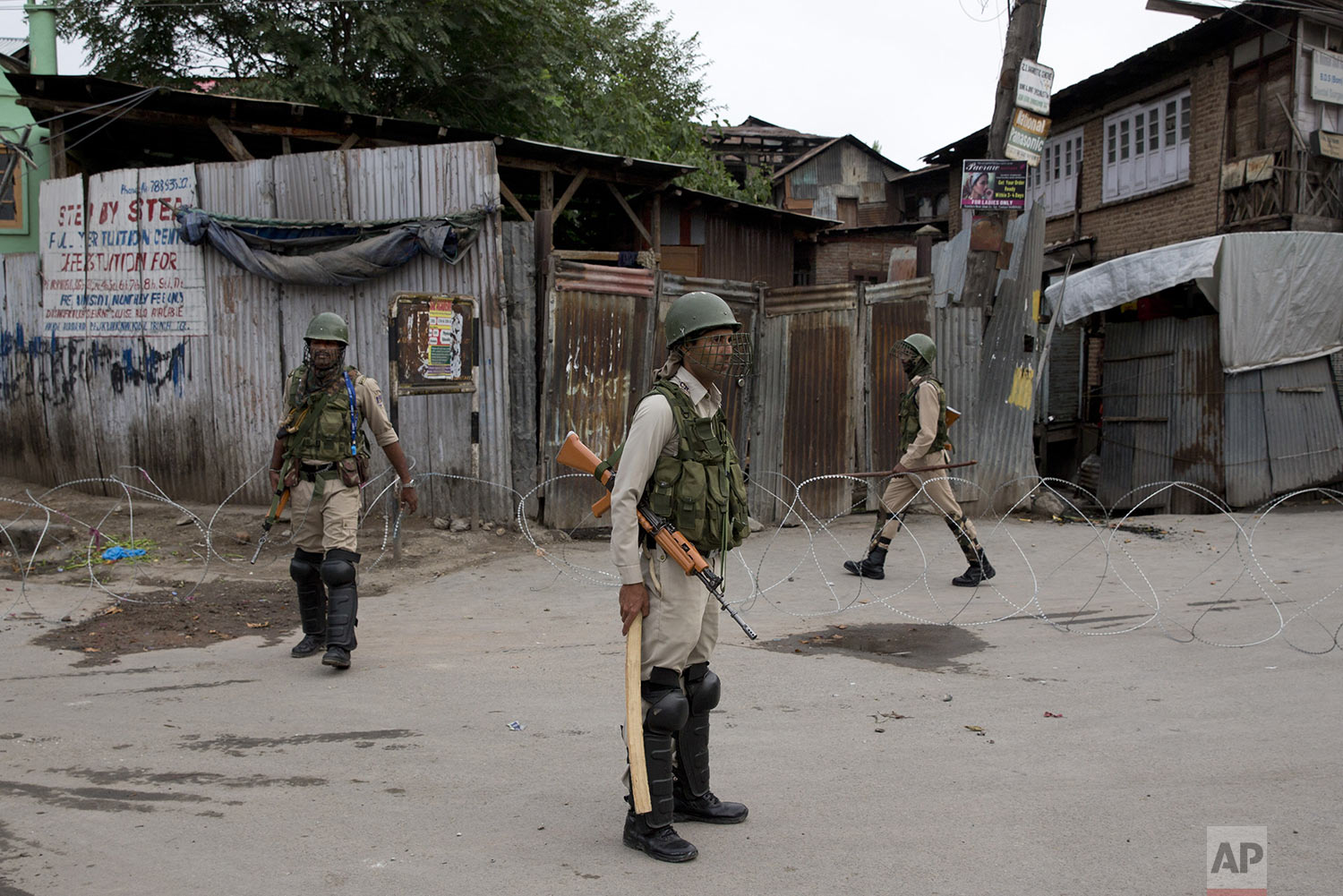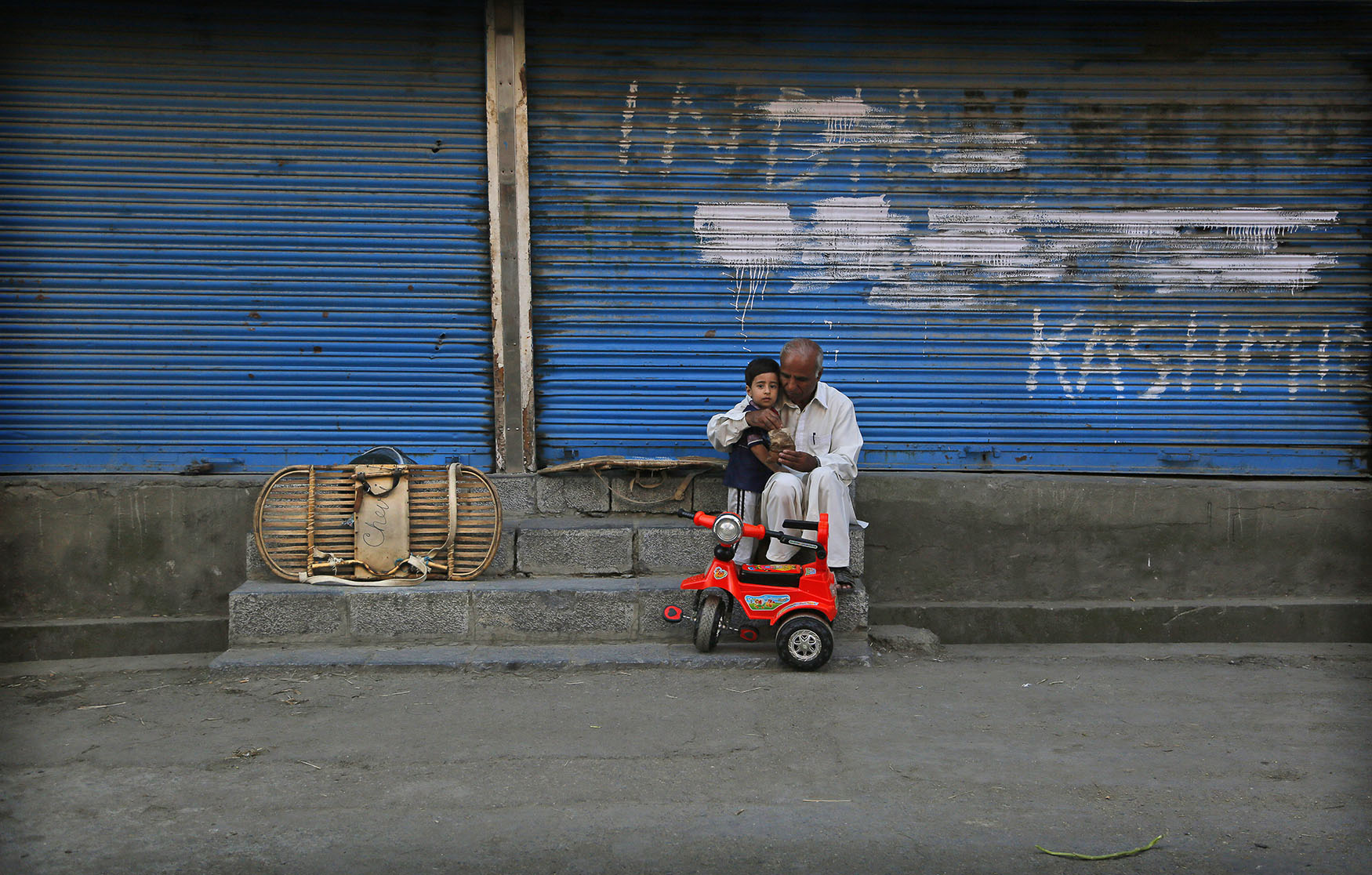Kashmiris protest amid unprecedented siege

Kashmir has gone quiet.
The streets of its cities, often reverberating with chants against Indian rule, are all but empty. The region is in the third week of an unprecedented lockdown that has largely kept its 7 million residents indoors.
But the anger among Kashmiris is palpable. It stems from a surprise decision by India Prime Minister Narendra Modi’s Hindu nationalist-led government to subsume the semi-autonomous region into the fold of the federal government by revoking its decades-old special status. On Aug. 5, the Modi government also proposed, and the following day passed, a bill downgrading the state of Jammu and Kashmir into two federal territories.
For days before the dramatic changes took place, rumors swirled in Kashmir that something big was afoot. New Delhi deployed thousands of troops to the Himalayan valley that has long been bitterly contested by Pakistan and India, and was already one of the most militarized regions on Earth. The government evacuated hundreds of Hindu pilgrims from the area around a remote mountain shrine. Tourists scrambled to leave.
Indian paramilitary soldiers stand guard on a deserted street during curfew in Srinagar, Indian controlled Kashmir, Thursday, Aug. 8, 2019. (AP Photo/Dar Yasin)
A Kashmiri prepares to catch a stone during an anti-India protest Srinagar, India, Friday, Aug. 9, 2019. The predominantly Muslim area has been under an unprecedented security lockdown and near-total communications blackout to prevent unrest and protests after India's Hindu nationalist-led government said Monday it was revoking Kashmir’s special constitutional status and downgrading its statehood. (AP Photo/Altaf Qadri)
Kashmiri Muslim protesters throw stones at Indian paramilitary soldiers during curfew like restrictions in Srinagar, India, Friday, Aug. 16, 2019. (AP Photo/Dar Yasin)
In this Friday, Aug. 9, 2019, photo, Kashmiri Muslim women shout slogans as Indian policemen fire teargas and live ammunition in the air to stop a protest march in Srinagar, Indian controlled Kashmir. (AP Photo/ Dar Yasin)
A Kashmiri woman breaks down after listening to a fellow Kashmiri narrating memories of past Eid in the valley as Kashmiris living in New Delhi gather for a function to observe Eid al-Adha away from their homes in New Delhi, India, Monday, Aug. 12, 2019. (AP Photo/Manish Swarup)
Left party supporters and students shout slogans during a protest against Indian government revoking Kashmir's special constitutional status in New Delhi, India, Monday, Aug. 5, 2019. (AP Photo/Manish Swarup)
Just before midnight on Aug. 4, Kashmir’s communications network went dark. Telephone landlines, cell phones, WiFi, broadband and cable TV were cut.
As a result, many Kashmiris were in the dark the following morning when Modi’s home minister announced the changes to Kashmir to an uproar from the opposition in Parliament.To prevent uprisings, the government imposed an indefinite curfew, dotting city streets with military barricades manned by thousands of armed soldiers shouldering assault rifles. Three weeks later, police in riot gear are there to help a limited stream of vehicles and pedestrians navigate the security maze.
Kashmir has been under siege before.
An Indian paramilitary soldier stands guard during security lockdown in Srinagar, Indian controlled Kashmir, Wednesday, Aug. 14, 2019. (AP Photo/ Dar Yasin)
Indian paramilitary soldiers stand guard during security lockdown in Srinagar, Indian controlled Kashmir, Sunday, Aug. 18, 2019. (AP Photo/ Dar Yasin)
Indian Paramilitary soldiers patrol during curfew in Srinagar, Indian controlled Kashmir, Friday, Aug. 9, 2019. (AP Photo/ Dar Yasin)
The problems in the region extend back to independence from the British raj and partition, in 1947, which left India in control of most of Kashmir, and Pakistan and China in charge of other parts of the territory. Most people in Hindu-majority India’s only Muslim-majority area support independence or a merger with Pakistan. The Indian government has often tried to suppress uprisings, including a bloody armed rebellion in 1989. About 70,000 people have been killed since that uprising and the subsequent Indian military crackdown that has left Kashmiris traumatized and broken.
A protester covers his face as he sits on a rock during an anti-India protest in Srinagar, India, Friday, Aug. 9, 2019. (AP Photo/Altaf Qadri)
But this latest decision has rendered Kashmiris helpless. They are unable to tell their stories to the world. Even the postal services to the region have been suspended.
While sporadic protests have erupted in several neighborhoods in Srinagar, Kashmir’s main city, images of what’s happening in the region are sporadic and incomplete. Using the controversial Public Safety Act, India’s armed forces have arrested protesters, professionals and even former state politicians who once defended India’s right to rule.
Some security restrictions have been lifted elsewhere in the region, such as in the Hindu-majority area of Jammu, where people were seen cheering the move by the government in street celebrations last week.
The change unfolded days before the Muslim festival of Eid al-Adha. Congregational Eid prayers were prohibited in most places; the government decided which mosques would be opened. This has furthered angered the people of the region, as they gear up for a long period of strife.
A Kashmiri man walks as Indian paramilitary soldiers stand guard during security lockdown in Srinagar, Indian controlled Kashmir, Wednesday, Aug. 14, 2019. (AP Photo/ Dar Yasin)
Indian migrant laborers carry their luggage and prepare to leave the region, at a railway station in Jammu, India, Wednesday, Aug. 7, 2019. (AP Photo/Channi Anand)
Indian migrant laborers sit inside a train as they prepare to leave the region, at a railway station in Jammu, India, Wednesday, Aug. 7, 2019. (AP Photo/Channi Anand)
An Indian boy sits inside a train waiting to leave a railway station in Jammu, India, Sunday, Aug. 4, 2019. (AP Photo/Channi Anand)
Pakistani protesters burn posters of Indian leaders during a protest in Karachi, Pakistan, Friday, Aug. 9, 2019. (AP Photo/Fareed Khan)
Indian Prime Minister Narendra Modi, center, greets school children after addressing the nation on the country's Independence Day from the ramparts of Mughal-era Red Fort, in New Delhi, India, Thursday, Aug. 15, 2019. (AP Photo/Manish Swarup)
An Indian paramilitary soldier orders a Kashmiri to lift his robe before frisking him during curfew in Srinagar, Indian controlled Kashmir, Thursday, Aug. 8, 2019. (AP Photo/Dar Yasin)
A Kashmiri livestock seller waits for customer ahead of Eid al Adha during curfew in Srinagar, Indian controlled Kashmiri, Friday, Aug. 9, 2019. (AP Photo/Mukhtar Khan)
A Kashmiri Muslim civilian crosses a check point ahead of Eid -ul Adha during curfew in Srinagar, Indian controlled Kashmiri, Friday, Aug. 9, 2019. (AP Photo/Mukhtar Khan)
Kashmiri Muslim boys offer Friday prayers at the doorway of a local mosque in an alley during curfew like restrictions in Srinagar, India, Friday, Aug. 16, 2019. (AP Photo/Mukhtar Khan)
An Indian paramilitary soldier stands guard as Kashmiri Muslims offer Friday prayers on a street outside a local mosque during curfew like restrictions in Srinagar, India, Friday, Aug. 16, 2019. (AP Photo/Mukhtar Khan)
A deserted street is seen through a barbwire set up as blockade during curfew in Srinagar, Indian controlled Kashmir, Tuesday, Aug. 6, 2019. (AP Photo/Dar Yasin)
Text from AP News story, Hundreds defy restrictions, join protests in Kashmir, by Ashok Sharma and Edith M. Lederer








